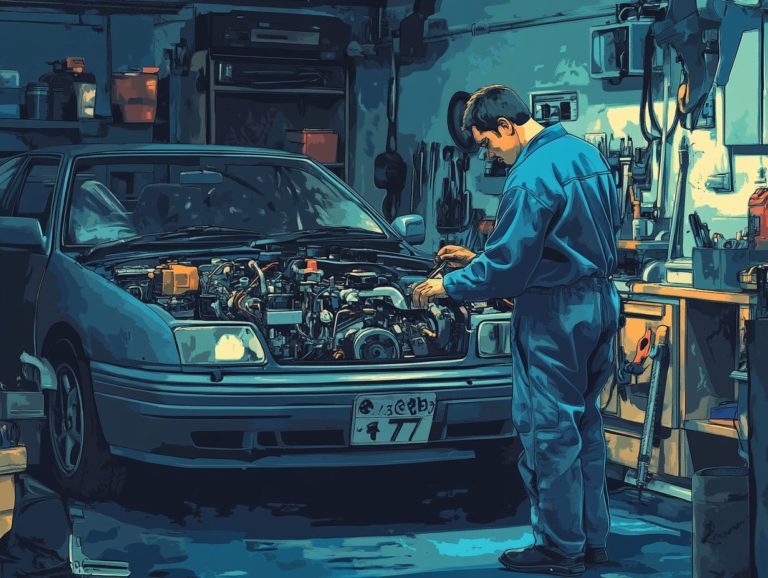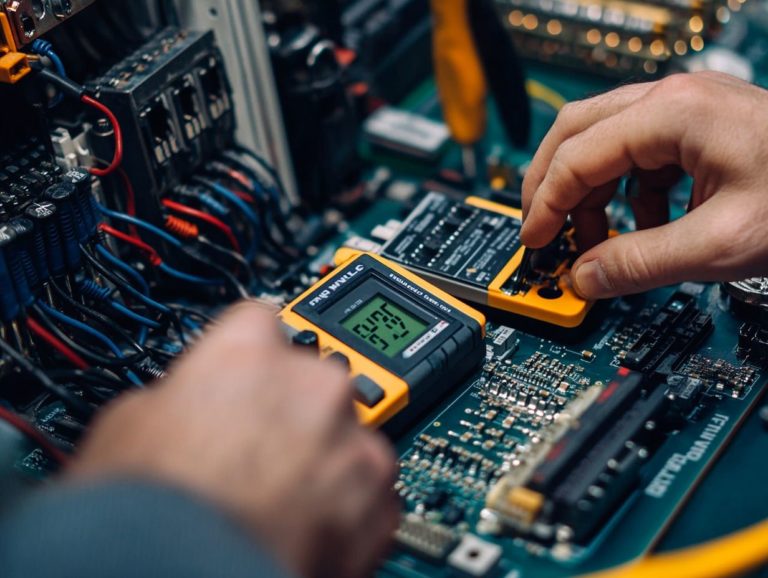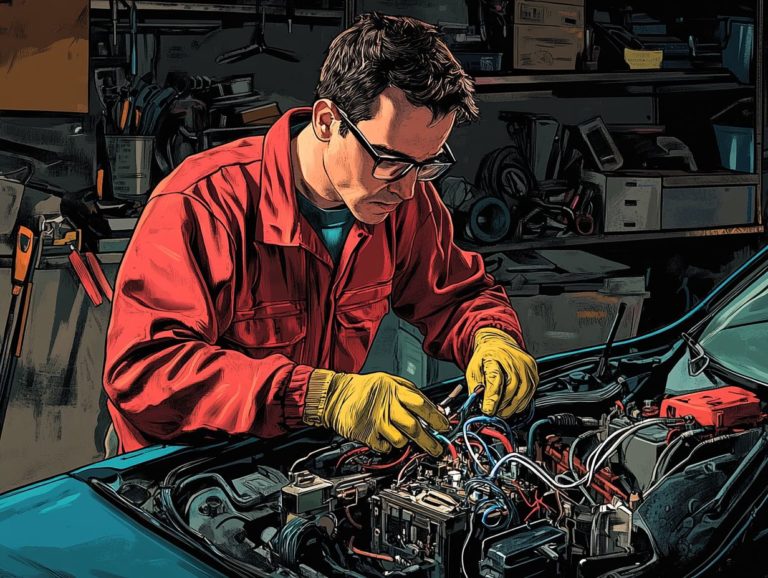5 Essential Maintenance Tips for New Cars
Owning a new car marks an exciting milestone, yet maintaining it properly is paramount for ensuring its lifespan and optimal performance.
Regular maintenance goes beyond merely keeping your vehicle looking pristine; it s vital for your safety and efficiency on the road. This article delves into five essential maintenance tips such as regular oil changes and tire inspections that will help you keep your car running smoothly.
It also highlights the significance of adhering to a maintenance schedule, what happens if you don’t take care of your car, and how proactive maintenance can ultimately save you money in the long run.
Whether you re a new car owner or simply looking to refresh your knowledge, these insights will ensure your ride stays in peak condition.
Contents
- Key Takeaways:
- 1. Get Regular Oil Changes
- 2. Check and Replace Air Filters
- 3. Inspect and Rotate Tires
- 4. Keep Up with Fluid Levels
- 5. Follow the Recommended Maintenance Schedule
- Unlock Your Car’s Potential: The Power of Regular Maintenance!
- Frequently Asked Questions
- What are the 5 essential maintenance tips for new cars?
- Why are regular oil changes important for new cars?
- How often should I rotate my tires?
- Why is checking and replacing air filters important for new cars?
- What is the proper tire pressure for new cars?
- Why is following the manufacturer’s scheduled maintenance important for new cars?
Key Takeaways:
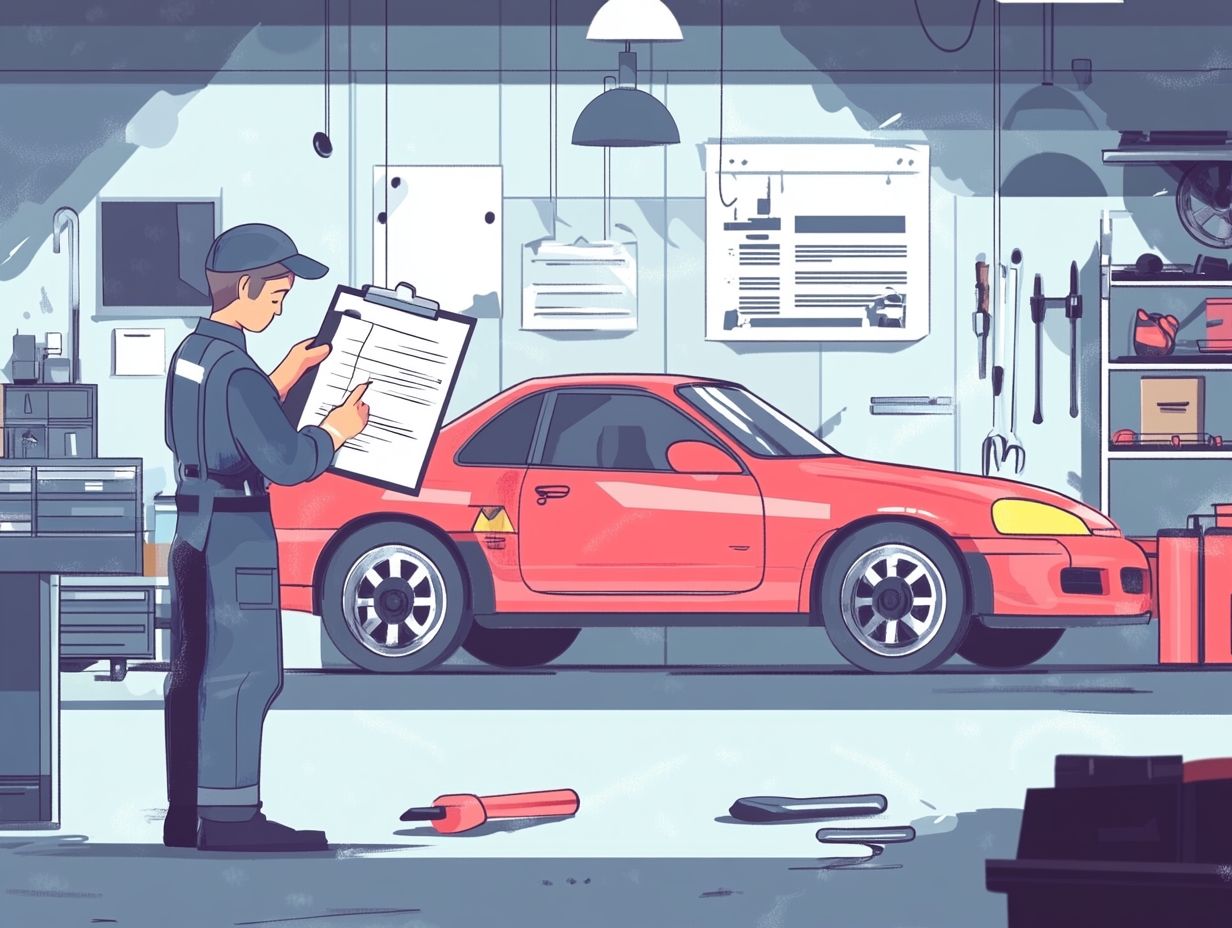
- Regular maintenance, such as oil changes and filter replacements, is crucial for keeping a new car running smoothly and extending its lifespan.
- Following the recommended maintenance schedule for a new car can prevent costly repairs and improve overall performance.
- Ignoring maintenance tasks can lead to serious issues like decreased fuel efficiency and potential breakdowns. Take care of your new car to keep it running great!
1. Get Regular Oil Changes
Regular oil changes are essential to effective car maintenance. They significantly influence your vehicle’s performance, lifespan, and overall health. By consistently replacing the engine oil, you ensure best lubrication, which minimizes wear and tear on engine components.
It also enhances fuel efficiency and reduces the risk of costly repairs in the future. This straightforward yet vital task is key to keeping your car running smoothly, especially as it ages. Neglecting this crucial aspect can lead to engine damage.
Most automotive experts recommend changing the oil every 3,000 to 5,000 miles, though some modern vehicles might have longer intervals thanks to advanced engine technologies.
Understanding the different types of engine oil synthetic, conventional, and blend oils helps you choose what s best for your car. Synthetic oil is made from chemical compounds, while conventional oil comes from refining crude oil. Skipping oil changes can lead to sludge buildup, reduced engine efficiency, and ultimately, severe engine damage.
Utilizing high-quality oil is critical for maximizing engine performance, ensuring proper lubrication and heat dissipation. Don t forget about oil filters; they must be replaced regularly to maintain the purity of the engine oil. This illustrates the interconnectedness of routine maintenance tasks in keeping your vehicle in peak condition.
2. Check and Replace Air Filters
Checking and replacing air filters is a vital aspect of your car maintenance routine. It significantly influences both the health of your vehicle and the comfort of your ride. Clean air circulation through the engine and cabin is essential; a clogged air filter can lead to reduced engine efficiency, increased emissions, and poor air quality within the vehicle.
Therefore, regular inspections and timely replacements are crucial for maintaining overall performance. Among the various types of air filters, engine and cabin air filters serve distinct yet equally important functions.
Engine air filters keep dirt and debris at bay, which is essential for optimal performance and longevity. Meanwhile, cabin air filters enhance the air quality inside your vehicle by trapping dirt, pollen, and allergens. It s wise to check these filters during every oil change and replace them every 15,000 to 30,000 miles or sooner if you find yourself driving in particularly dusty conditions.
Look out for signs of a dirty filter: reduced airflow in the cabin, unusual engine noises, and a noticeable drop in fuel efficiency can all signal trouble, leading to increased costs at the pump.
3. Inspect and Rotate Tires
Inspecting and rotating your tires regularly is essential for maintaining your vehicle. This practice promotes even tire wear and enhances safety. It also ensures optimal traction and fuel efficiency. By routinely checking tire pressure and the depth of the grooves in your tire that provide grip, you can catch potential issues early. This significantly reduces the risk of blowouts and extends the lifespan of your tires. Ultimately, this contributes to better performance on the road.
Rotate your tires every 5,000 to 7,500 miles, depending on your vehicle type and driving habits. There are several effective methods for tire rotation, including:
- Front-to-back
- Side-to-side
- A cross pattern
These methods distribute wear evenly across all tires, ensuring longevity and performance.
Maintaining proper tire pressure is crucial. Under-inflated tires can lead to decreased fuel efficiency and compromised handling, while over-inflated tires may cause excessive tread wear. Keep a close eye on tread wear indicators to enhance safety by improving grip. This also boosts overall vehicle handling, ensuring a smoother and more controlled driving experience.
4. Keep Up with Fluid Levels
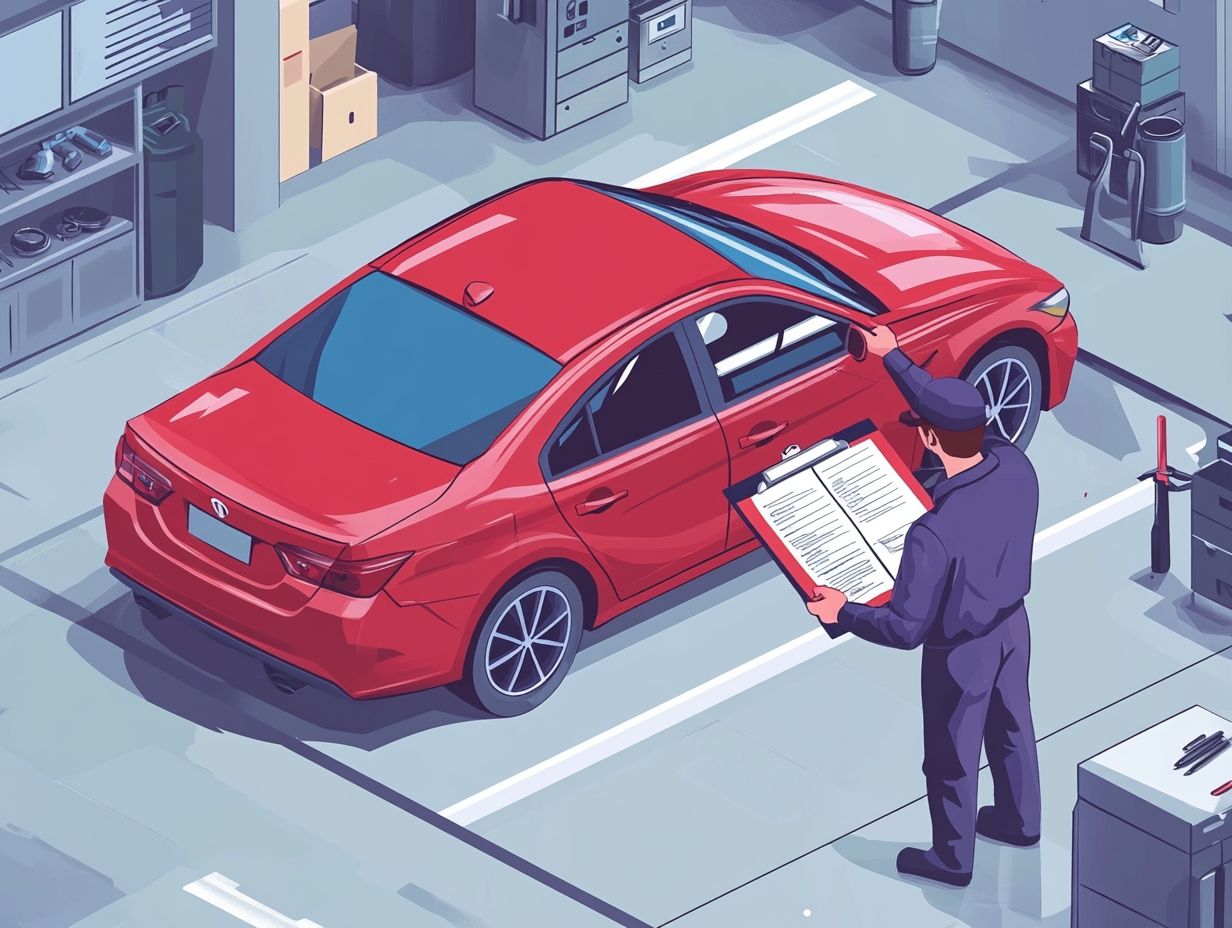
Keeping your fluid levels just right is key to making your car run like a dream! It s a critical aspect of your car’s upkeep, ensuring that essential systems from the brakes to the engine operate smoothly. Regularly checking and topping off fluids like brake fluid, coolant, and engine oil can prevent overheating, braking issues, and costly repairs. This ultimately enhances both safety and performance on the road.
Don t overlook windshield washer fluid; clear visibility during inclement weather is crucial. Checking fluid levels is straightforward and can easily be incorporated into your routine inspections:
- Check engine oil with a dipstick.
- Glance at the reservoirs under the hood for brake fluid and coolant.
Low fluid levels can lead to serious safety hazards, such as reduced braking effectiveness or engine overheating. Don t wait regularly check your fluid levels to ensure your safety and avoid costly repairs!
By staying proactive with these checks, you ensure a reliable driving experience and save time and money over the long haul.
5. Follow the Recommended Maintenance Schedule
Following the recommended maintenance schedule is essential for ensuring the long-term health and safety of your vehicle. It significantly reduces the chances of unexpected repairs and breakdowns. Taking a proactive approach to car maintenance enhances your vehicle’s performance and boosts safety. Regular servicing addresses potential issues before they escalate.
By adhering to the manufacturer’s guidelines, you stay informed about crucial maintenance tasks like oil changes, brake inspections, and tire rotations. This provides you with peace of mind and a smoother driving experience.
Preventive maintenance includes examining fluid levels, replacing air filters, and inspecting belts and hoses at designated intervals. This diligence keeps minor issues from morphing into costly repairs. It also maximizes fuel efficiency and extends your vehicle’s lifespan.
Keeping meticulous records of these maintenance activities helps you track performance trends and maintain resale value. By prioritizing this essential upkeep, you ensure your safety on the road while avoiding unnecessary financial burdens down the line.
Unlock Your Car’s Potential: The Power of Regular Maintenance!
Regular maintenance is crucial for new cars. Following the best practices for new car maintenance sets a strong foundation for vehicle health and performance, ensuring compliance with safety and emissions standards.
By following a maintenance schedule, you protect your investment and maintain warranty coverage. This approach also helps you avoid issues that could compromise your vehicle’s functionality.
This proactive method enhances your car’s longevity and reliability. It fosters responsible car ownership, allowing you to enjoy a safe and efficient driving experience.
Routine checks help you monitor essential components like brakes, tires, and fluid levels critical for optimal performance. Regular servicing can catch problems before they become costly headaches!
Emissions inspections are vital, not only for meeting regulations but also for demonstrating environmental responsibility.
By prioritizing these maintenance tasks, you extend your vehicle’s lifespan and contribute to safer roads and a reduced environmental footprint. This showcases your commitment to both your car and the community.
What Are the Consequences of Neglecting Maintenance?
Neglecting regular maintenance can lead to a series of problems that negatively impact your vehicle s performance, safety, and overall reliability. This oversight often results in costly repairs and a compromised driving experience.
Over time, skipping essential tasks like oil changes, brake inspections, and tire rotations can lead to serious issues, such as engine failures and brake malfunctions. Ignoring these crucial upkeep tasks jeopardizes your investment and the safety of everyone on the road.
For example, an engine that hasn t seen regular service can overheat, resulting in catastrophic damage that demands expensive repairs. Neglecting brake system checks can lead to brake failure, putting lives at risk.
The financial implications are clear. While preventive maintenance costs may seem trivial now, expenses from emergency repairs can skyrocket. Regular check-ups might feel like a burden, but they offer significant long-term savings when you consider potential breakdowns.
How Often Should Maintenance Be Done on a New Car?
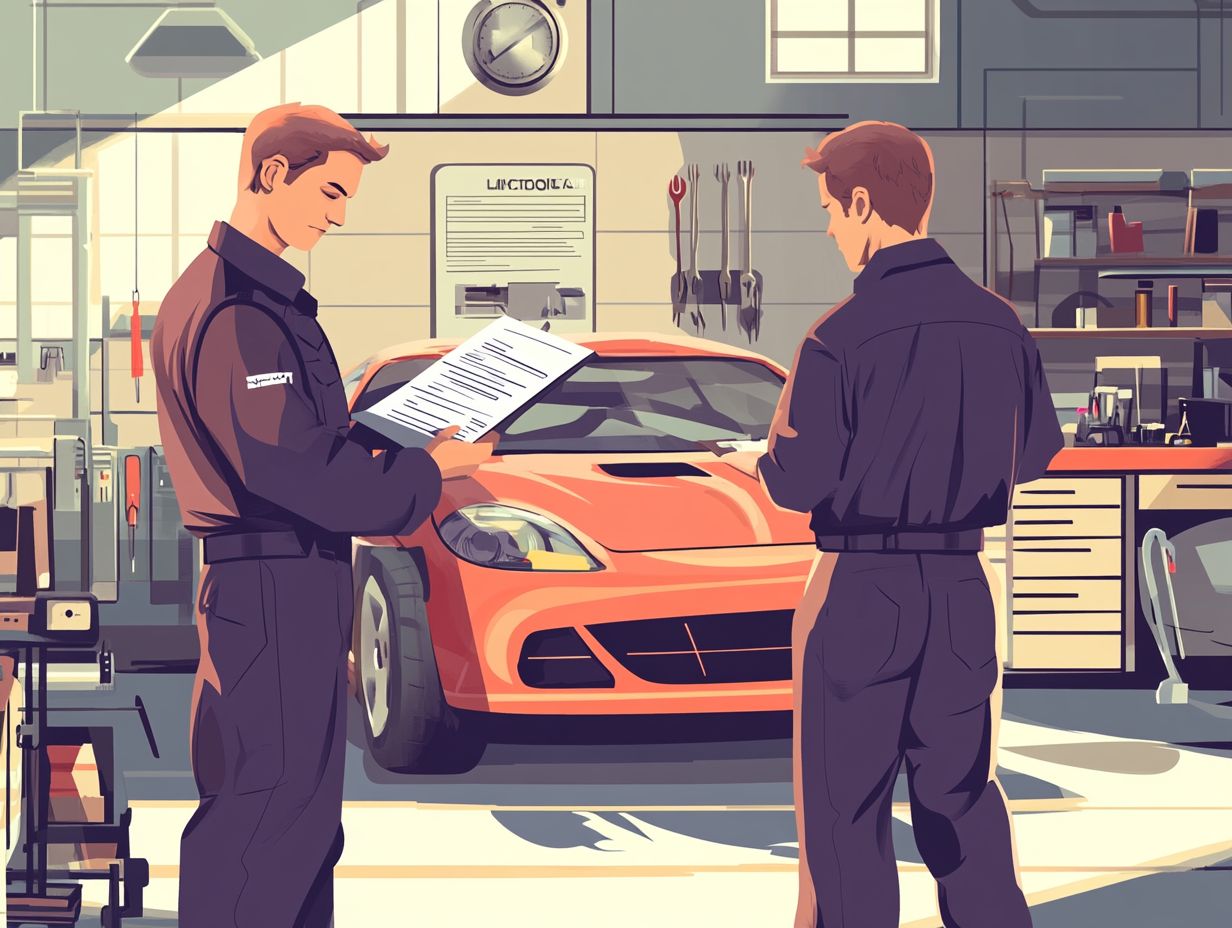
Maintenance frequency for your new car typically matches the manufacturer’s guidelines, suggesting you service your vehicle every 5,000 to 10,000 miles based on driving conditions and your vehicle type. However, if you own an older vehicle, consider following these 5 tips for maintaining older vehicles to ensure it remains in good condition.
Regularly scheduled maintenance isn’t just a formality; it’s essential for staying ahead with preventive measures. It ensures critical systems like brakes and tires are functioning at their best. Following these essential maintenance tips helps you understand your responsibilities as a car owner.
Several factors influence maintenance intervals. If you have a fast driving style with sudden stops, you may need oil changes more frequently. Environmental factors, such as harsh winter conditions or exposure to coastal saltwater, can also affect the lifespan of various fluids and components.
If you often drive on rough terrains, you might need tire rotations sooner than someone who primarily drives on smooth highways. Adjusting your maintenance schedule to reflect your unique driving habits can significantly extend your vehicle’s lifespan and ensure its reliability.
What Are the Common Maintenance Tasks for New Cars?
Common maintenance tasks for your new car include regular oil changes and tire rotations. For those with older vehicles, following maintenance tips for high-mileage cars such as brake inspections and checks of essential fluids is also necessary to ensure optimal vehicle health and performance.
These tasks are not just routine; they are vital for maintaining a reliable and safe driving experience. They also extend the lifespan of your vehicle and help prevent costly repairs. By understanding and prioritizing these fundamental maintenance tasks, you can learn tips for avoiding common car repairs and take command of your car’s well-being.
Staying informed about the manufacturer s recommended service intervals allows you to create a routine to make sure you don t miss anything. For instance, a well-timed oil change, typically every 5,000 to 7,500 miles, keeps your engine running smoothly and enhances fuel efficiency. Regular tire rotations, usually every 6,000 to 8,000 miles, promote even wear and maximize tire lifespan while improving traction.
Inspect your brakes and fluid levels every few months. This is crucial for your safety. To streamline these tasks, consider keeping a maintenance log or setting up calendar reminders. Establishing a relationship with a trusted mechanic can also be beneficial, as they can offer professional guidance tailored to your vehicle s specific needs.
How Can Regular Maintenance Save Money in the Long Run?
Investing in preventive maintenance pays off! Timely oil changes and brake inspections keep your wallet happy by preventing major repairs, enhancing your vehicle’s performance, and extending the lifespan of critical components.
Neglecting basic upkeep can lead to expensive repairs, like a failing transmission or engine problems. These issues could set you back thousands of dollars. On the flip side, something as simple as routine tire rotations and alignment checks can greatly boost your fuel efficiency, allowing your vehicle to perform better with less strain on the engine.
A well-maintained vehicle may achieve 25% better mileage than one that skips regular adjustments. These savings add up over time, proving that prioritizing maintenance isn’t just an expense it’s an investment that pays off in fuel economy and overall value.
What Are the Signs That a New Car Needs Maintenance?
Recognizing the signs that your new car needs maintenance is crucial for ensuring its longevity and safety. To avoid pitfalls, it’s important to be aware of common maintenance mistakes new car owners make. Early detection of issues can save you from more extensive repairs down the road.
You should pay close attention to these symptoms, as they serve as vital cues for necessary upkeep. For instance, if you hear unusual noises like grinding or squeaking, get it checked immediately, as it could indicate problems with the brakes or drivetrain.
Don t overlook dashboard warning lights; they often point to underlying problems that require your prompt attention, such as low oil pressure or engine malfunctions. A drop in fuel efficiency might suggest that your engine is straining or that the air filter needs replacing.
Additionally, any noticeable changes in handling or braking can compromise your safety, making regular inspections imperative. By addressing these early signs, you can save both time and money, ensuring your vehicle operates smoothly for years to come.
Watch this video for more tips on car maintenance!
Frequently Asked Questions
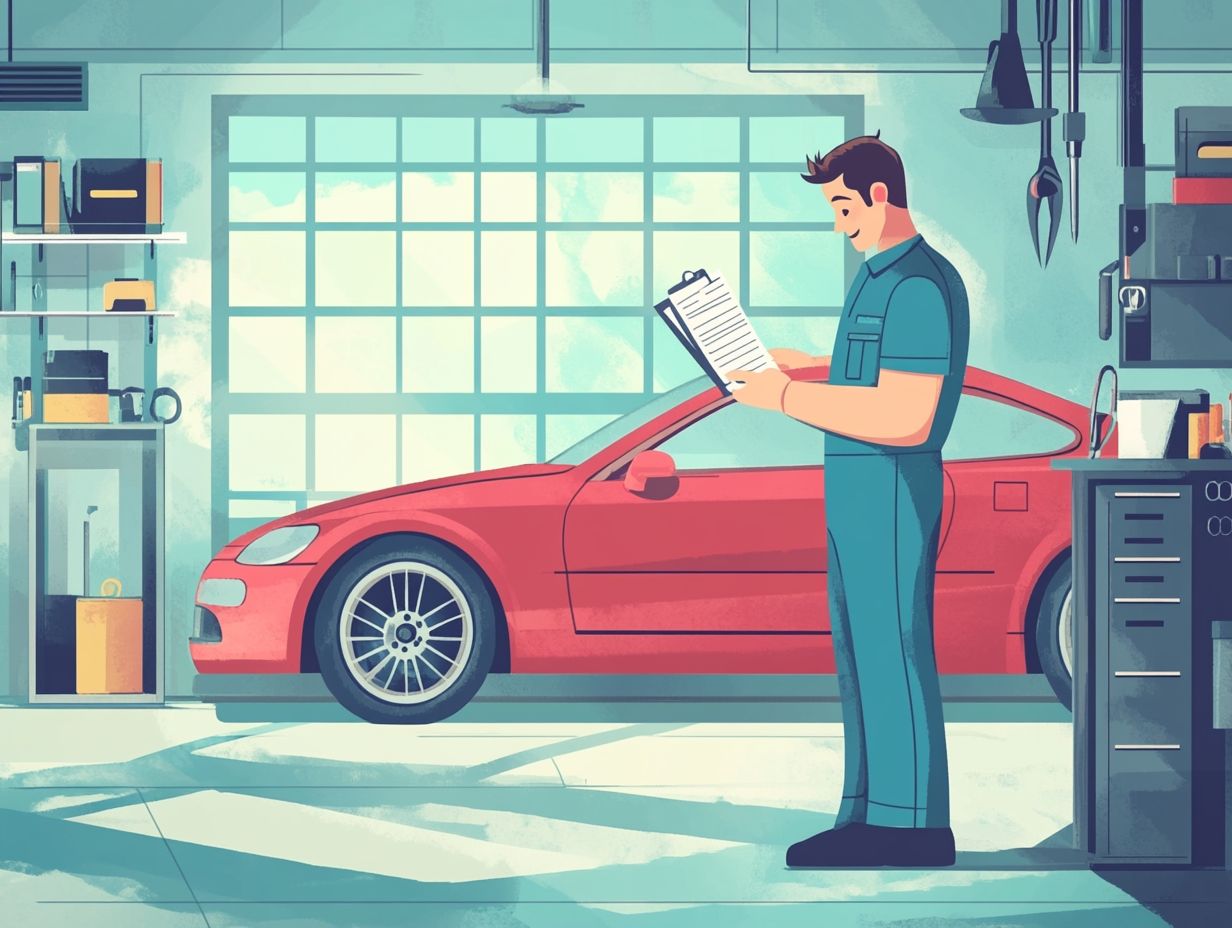
What are the 5 essential maintenance tips for new cars?
Here are some must-do tasks for your new car: regular oil changes, tire rotations, checking and replacing air filters, maintaining proper tire pressure, and keeping up with 5 essential tips for common car maintenance from the manufacturer.
Why are regular oil changes important for new cars?
Regular oil changes ensure that your engine is properly lubricated and running efficiently. They also help to extend the life of your engine and prevent costly repairs in the future.
How often should I rotate my tires?
Tires should be rotated every 5,000 to 7,000 miles to ensure even wear and tear. This helps to prolong the life of your tires and improve overall vehicle performance.
Why is checking and replacing air filters important for new cars?
Air filters keep your engine clean and free from debris. This is essential for optimal performance, so check and replace them every 12,000 miles or as the manufacturer recommends.
What is the proper tire pressure for new cars?
The right tire pressure can make a big difference in your car’s performance! Always consult your owner’s manual or the sticker inside your driver’s door to ensure accurate pressure.
Why is following the manufacturer’s scheduled maintenance important for new cars?
Regular check-ups are crucial for keeping your car running smoothly. Skipping maintenance can lead to expensive repairs down the road!

